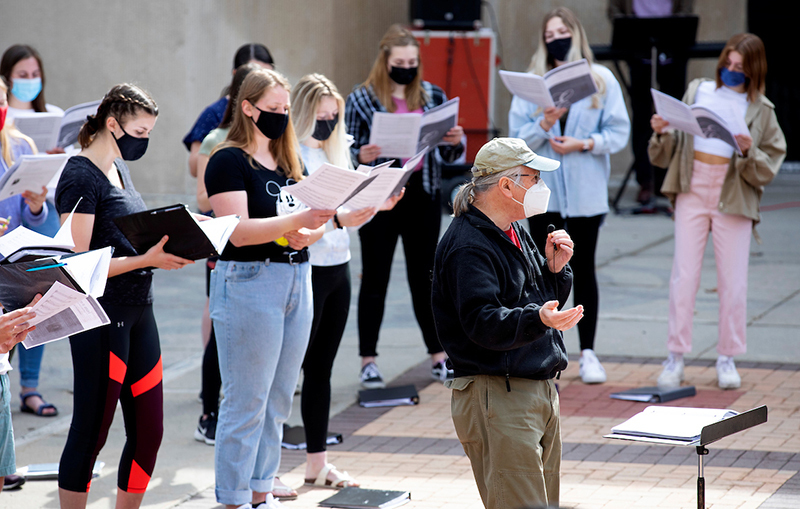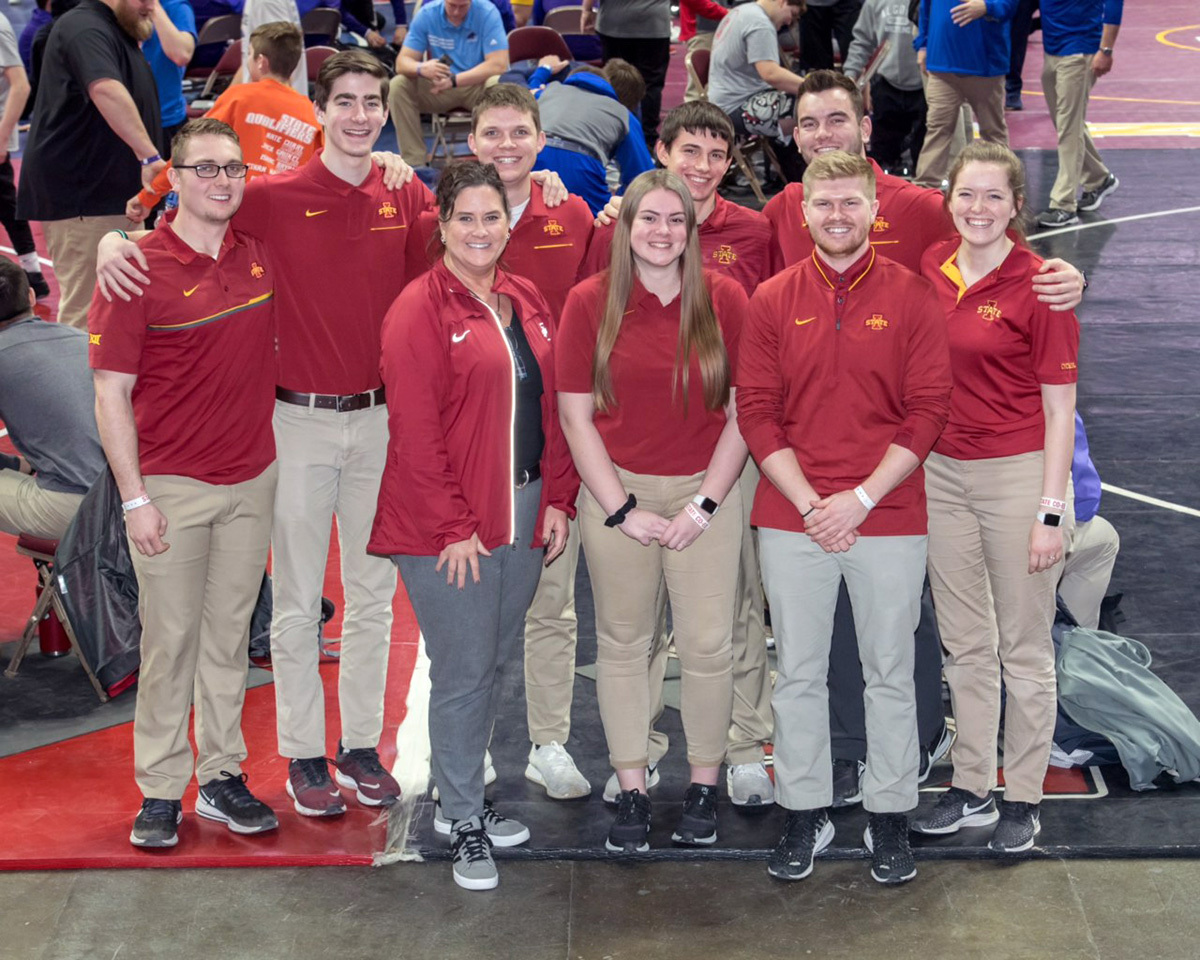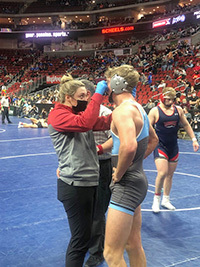Together again

Photo by Christopher Gannon.
Members of the Iowa State Singers, under the direction of Louise Moen Hamilton Professor of Music James Rodde (front), rehearsed in Monday's midday sunshine on the Simon Estes Music Hall plaza. It was the group's first full-choir rehearsal of the semester and the first for Rodde, who has an alternative work arrangement. He said other large-group sessions this spring will be outdoors and thus weather-dependent.
During the winter months, the 72-member choir divided into thirds and rehearsed (masked and distanced) at three indoor locations for up to 30 minutes at a time. Twice this year, choir members sang for each other in Beardshear Hall, using the top three floors.
"Those moments helped make us feel like a choir again," Rodde said.
The Iowa State Singers hope to perform in late April at the campanile during a lunch hour, but won't host any indoor concerts. The group has three rehearsing/recording sessions scheduled on the Stephens Auditorium stage, also in April.
One of the pieces the singers sight read for the first time Monday, "And So I Go On," is a memorial to a conductor who died unexpectedly at a young age. "Singers undoubtedly will find a deep connection between this text and the losses we have endured during the pandemic," Rodde said.
Thielen partners with public health to offer limited COVID-19 vaccine
Thielen Student Health Center (TSHC) is assisting Story County Public Health to administer COVID-19 vaccines for those eligible in phases 1A and 1B as part of the state's strategy for phased distribution. Erin Baldwin, TSHC director and associate vice president for student health and wellness, said availability is very limited, and Thielen staff will contact those who are eligible.
Baldwin said they are taking a similar approach to other Story County health care providers and first offering the vaccine to the oldest employees and working their way down the list. So far, ISU employees who are 72 years of age and older have been contacted and offered the opportunity to receive the vaccine through the student health center. Employees and students between the ages of 65 and 72 will be contacted as more vaccine becomes available.
Thielen staff is administering the vaccine outside of normal business hours and in addition to their regular duties. Due to the extra workload, Baldwin said it is imperative that the Iowa State community not call the clinic to inquire about eligibility.
Iowa State is receiving small allotments of vaccine, which come directly from Story County Public Health's allocation received through the Iowa Department of Public Health (IDPH). The effort started with Iowa State employees who met the IDPH guidelines for phase 1A and then expanded to include those who are 65 years of age and older, in accordance with IDPH guidelines.
Baldwin said an ISU vaccination working group is developing plans to offer the COVID-19 vaccine to all employees and students once it is available to the general public. Until then, she encourages those who are eligible for the vaccine to consult with their doctor or pharmacist about availability. All Story County and statewide vaccine providers are listed on the ISU vaccination website.
Further updates on vaccine availability for populations beyond the IDPH phase 1B will be shared with the campus community as available.
Wickert discusses fall semester planning at Faculty Senate
Senior vice president and provost Jonathan Wickert shared some early planning regarding instruction and university operations for fall semester during the March 9 Faculty Senate meeting. Wickert emphasized no final decisions have been made for fall. He also said discussions continue around next year's academic calendar.
"We need to plan for how we get back to the academic and campus experience we are known for," he said. "We need to make some assumptions about the likely scenario."
Wickert said the key assumption is COVID-19 vaccinations will be widely available this summer, which would allow the return of in-person classes, labs and studios "at pre-pandemic levels." It also includes returning to the normal classroom attendance policy.
"That is not to say we won't have online or hybrid classes," he said.
These kinds of classes were available before the pandemic based on pedagogy and meeting students' needs, and they will be part of instruction moving forward, Wickert said.
The Cyclones Care campaign would continue in a modified form with the possibility of requiring face coverings in classrooms and other safety protocols, Wickert said.
Wickert said plans are forming for Iowa State, as well as the University of Iowa and University of Northern Iowa, to hold winter sessions during the 2021-2022 academic year.
Drop limit
Senators will vote at the next meeting on changes to the drop limit policy. Students -- regardless of what grade they enter the university -- would be able to drop a maximum of five classes. Currently, students who begin above freshman classification or enroll as an undergraduate after receiving a bachelor's degree are allowed four drops. Lecture and laboratory courses that must be taken concurrently would be considered one course drop.
Election
Jamie Beyer (apparel, events and hospitality management) was elected a Faculty Senate representative to the athletics council.
Other business
Senators also will vote next month on:
- A master of arts in teaching for mathematics education major in the College of Human Sciences. The 12-month program is recognized as an initial teacher preparation program at the graduate level, and aids students with a bachelor's degree seeking a license to teach secondary education. Currently, the program is offered as a graduate specialization in a master of education and is not specific to math.
- A master of arts in teaching for secondary education major in the College of Human Sciences. The program supports students who have a bachelor's degree but need to complete additional requirements, like student teaching, in a master's program.
- A secondary major in education in conjunction with a major offering a teacher preparation program. It recognizes the work done by students who plan to become educators. Numerous programs do not note educator preparation on transcripts leading to disadvantages for some students in their job search.
- A bachelor of business administration in the Ivy College of Business. The online, 48-credit degree program targets working professionals with at least 45 college credits who want to complete a four-year degree in business while maintaining a full-time job. It focuses on skill building in negotiation and conflict resolution, international management, human resource management, entrepreneurship and other areas.
- A major in human resource management (HRM) in the Ivy College of Business. It would move HRM from a track in the management major to its own major, and provide greater expertise and training for students to be immediately employable. ISU would be the first Board of Regents university to offer it.
- A minor in cyber-physical systems in the mechanical engineering, electrical and computer engineering, and aerospace engineering departments. It would be the first minor of its kind in Iowa. Three required three-credit courses would be developed for this 15-credit minor.
Pandemic precautions, helpful colleagues take sting out of Ross Hall fire

ServiceMaster crews work to clean soot on the first floor of Ross Hall on March 3. Photo by Christopher Gannon.
There's no good time to have a fire empty out a six-story academic building for months. But if it's going to happen, this year probably is the best timing imaginable.
The increased reliance on remote work and instruction during the pandemic -- along with a few helping hands -- made the Feb. 22 fire in Ross Hall relatively easy to manage for the English, political science and history departments that call the building home, department chairs said.
No one was injured in the fire, which began in a first-floor custodial closet about 6 a.m. But due to extensive smoke from the fire, the building is closed for a cleanup expected to take until at least early summer. No classes will be held in Ross Hall until fall, and June is the earliest that faculty and staff could be back.
Under normal conditions, that would be a major disruption. Ross Hall has about 20 classrooms and teaching labs in the basement and first floor, with English office space on floors two through four, political science offices on the fifth floor and history offices on the sixth floor. The three departments combined have more than 300 faculty and staff. But most employees already were working remotely at least part-time, and everyone has recent experience with it.
"It's been more of an inconvenience than anything else," said Simon Cordery, history department chair and the Ross Hall building supervisor.
No workplace worries
The classes that had been meeting in-person were moved to other buildings, which would have been a bigger challenge any other year. There are several options for the handful of faculty and staff who need temporary campus workspace, mostly for student office hours. Department chairs in economics (Heady Hall) and world languages and cultures (Pearson Hall) offered up some space, and the college's offices in Catt Hall and the English department suite on the third floor of Curtiss Hall also are possible landing spots. Mail for all three Ross Hall departments is being rerouted to nearby Heady Hall.
"We've been very fortunate to have colleagues who have leapt to the fore to offer their facilities to us," Cordery said.
Dedicated space isn't necessarily a requirement, thanks to reduced campus foot traffic. Political science department chair Mack Shelley is working primarily in two appropriately named small rooms off the Memorial Union food court, alternating as needed.
"I've been doing Nook or Cranny the last couple weeks, depending on what's been available," he said.
Office cleaning planned
Being the largest department in the building and occupying the floors closest to the fire, English is the most affected of the three departments. Chair Volker Hegelheimer said two research projects are delayed temporarily. One faculty member worked entirely from a computer in a Ross Hall office, but electronics in the building are out of commission for several weeks for cleaning.
"There's definitely some impact," said Hegelheimer, who noted that associate chair for operations Matthew Sivils has been essential in handling the department's response.
Still, a similar fire in a different building could have presented more complications. The Ross Hall chairs met with the department chairs who navigated through the Sweeny Hall fire in 2014 and found that water damage from the sprinkler system was one of the biggest issues following that fire. In Ross Hall, there is no sprinkler system, which left office contents unscathed.
Though spared a soaking, books and other items in many offices are covered with soot. ServiceMaster crews restoring the building will go room-by-room, cleaning all personal effects. Faculty and staff should remove anything they don't want cleaned or that they need immediately.
"We advise them not to linger, in part because the fire alarm got destroyed in the fire," Hegelheimer said.
All three chairs said faculty and staff have been flexible and resilient in the wake of the fire, though it's yet another wrinkle in what's been an eventful 12 months.
"I kind of figure a plague of locusts is next on the list. Maybe an earthquake would be amusing? You just have to roll with the punches," Shelley said.
Workday Student to launch in stages in 2023 and 2024
Work on the second phase of Workday is about to kick into high gear, with project leaders planning to go live with a new system in June 2023. And three months later in September. And three more times in 2024.
It will take an estimated four years to expand Workday to student information and billing, consolidating Iowa State's business functions on the adaptable and cloud-based platform. But unlike the first phase devoted to financial and human resources transactions, Workday Student will roll out in five segments over 18 months instead of culminating in one launch.
For more information
Workday Student is the next phase of WorkCyte, a comprehensive effort to modernize Iowa State's administrative systems. Check out Inside Iowa State's WorkCyte archive.
A five-step implementation has many benefits, spreading out the project in a sequence that tracks a student's life cycle, vice president and chief information officer Kristen Constant told the Professional and Scientific Council during a presentation at the council's March 4 meeting.
Constant outlined a tentative timeline:
- June 2023: Recruiting, admissions, application fees and tuition deposits, academic calendar, academic units, programs of study and student core
- September 2023: New student financial aid, course catalog and class schedule
- March 2024: Registration, advising, tuition and fee assessment, continuing student financial aid and student record conversion
- September 2024: Financial aid distribution, billing and payment processing
- December 2024: Grading, graduation, transcripts and end-of-term processing
Why change?
Deploying Workday Student in stages will make integrating the new components with legacy systems an ongoing challenge throughout the project. But the current patchwork of aging technology must be replaced because it’s complicated and difficult to maintain, Constant said.
Many of the existing systems are based on campus mainframes, which raised concerns when a derecho knocked out power in Ames in August, she said. They also are more restrictive, which required scrambling last year to adopt changes to the academic calendar and grading schemes.
Pandemic-driven changes that involved financial or personnel information, on the other hand, were simple to make with Workday. And there were no worries about losing Workday data when the derecho hit because it's stored on a network of remote internet servers.
"I think these are good examples of why we're doing this," Constant said.
Reevaluating the fit
Before ISU leaders selected Workday as the university's new enterprise platform in late 2016, they reviewed what its student information system offered and what Iowa State needs. Two things have changed since then, Constant said: "What we need, and what they offer."
Reevaluating both Iowa State's requirements and Workday's student information product was essential to ensure it was still a good fit, and Constant said Workday addressed a long and fresh list of the university's needs. More than 100 people on campus participated in Workday Student demonstrations, and project leaders also made virtual visits to institutions implementing Workday Student.
Building the team
Workday Student's co-leaders are Constant and Steve Mickelson, former chair of agricultural and biosystems engineering recently appointed to a four-year post in the provost's office to work on the project.
Much of the rest of the project team is being assembled now. The core team will include 80 to 90 ISU employees, who will work alongside change management consultants and Workday staff and collaborate with numerous other university employees. The project budget includes funds to hire new ISU employees to take over the duties of those tapped for the core team, Constant said.
"We have carefully budgeted in backfill to ensure we can do this in a humane way, if you will, so that people can do their best work and maintain a good quality of life. You all know how very lean we are as a university. A project of this magnitude, we can't just absorb it without the infusion of extra resources," Constant said.
Other business
Council members also:
- Approved the council's compensation and benefits recommendation for fiscal year 2022. Acknowledging the budget challenges ahead, the council's recommendation -- which typically suggests an across-the-board raise amount for P&S staff -- doesn't call for a salary increase and instead focuses on benefits and policies.
- Elected officers for the 2021-22 academic year: president-elect Jamie Sass, vice president for university planning and budget John Hascall, vice president for university community relations John Burnett-Larkins, vice president for equity and inclusion Lindsay Moeller and secretary/treasurer Bridgette Hare. Moeller and Burnett-Larkins are incumbents. All officers ran unopposed. Next year's council president is Chris Johnsen. Council elections will be held later this month. Nominations are open through March 12.
Connection with tourney shines light on Iowa State athletic trainers

Iowa State athletic trainers during the 2020 state wrestling tournament. Front (left to right) Mary Meier, Katelyn Nelson, Adam Sibert and Abigail DeWitt Johnson. Back row, Levi Brouse, Hudson Kopp, Jordan Graham, Parker Eley and Derrik Kerns. Photos courtesy of Mary Meier.
Next year's high school state wrestling tournament carries an increased level of importance, and not just because a record four wrestlers could win their fourth state title. It also marks the 50th year Iowa State athletic trainers will provide their services at one of the biggest high school events in the state.
"Frank Randall was the head athletic trainer at ISU back then, and there were not many athletic trainers working in the state," associate athletics director for sports medicine Mark Coberley said. "He was always pushing to get an understanding of what athletic trainers could do to the public, and he set up outreach programs where Iowa State provided athletic trainers to different events."
Video
Keeping athletes healthy is always a difficult job. But the challenges have only increased as the COVID-19 pandemic has made close contact with patients more difficult. The work and training continues for students at Iowa State.
That has grown over the years to between 25-35 Iowa State students putting skills learned in a classroom into practice in a high-intensity environment that helps the four-day February tournament run safely.
"We are there, but we try to let our students do everything and just guide them," said kinesiology clinical associate professor Mary Meier, who is in her third year directing the athletic trainers at the state tournament. "It is a real thing that is happening, not something they are reading in a book."
It also shines a light on the university as the trainers -- clad in Iowa State shirts -- are thanked for their efforts daily during a session.
"We are fortunate at Iowa State that they have asked us to coordinate that care," said Coberley, who worked the tournament as a student in the 1980s.
Student driven
An event as big as state wrestling involves plenty of planning and requires student trainers to understand the behind-the-scenes organizational effort. They must:
- Sign up student athletic trainers
- Determine what supplies are needed
- Oversee the athletic training room
- Decide who will lead instruction before each new shift
- Plan for emergency situations
Students take courses on evaluation of injuries, rehabilitation, dealing with emergencies, and prevention and care before staffing the tournament.
"They have coursework they have taken, but before each session we have a five- to 10-minute discussion going over their mat, the supplies and how to handle some situations," Meier said. "It is a crash course."
Student trainers are supervised by certified athletic trainers, but Meier said they perform most of the duties on their own. They also coordinate care with two physicians at each session.
The chance to see and have a hand in planning a large event serves the trainers well long after graduation as they apply that knowledge in future jobs, Meier said.
Invaluable experience
Internships, summer jobs and trips to other countries are vital learning tools for students across campus, but rarely is knowledge gained in a classroom used and expanded on in such a condensed time frame.

Student athletic trainer Grace Quinn helps a wrestler stop bleeding during the 2021 state wrestling tournament.
Meier said athletic trainers typically spine board one to two athletes during the tournament, and deal with bloody noses or cut lips on a nearly match-by-match basis. This year's tournament saw a trainer treat a dislocated elbow on the mat.
"The trainers also are working with a time limit because you only get so much time to stop a bloody nose," Meier said. "Our kids get excited working it because there is an adrenaline rush knowing you don't have all the time."
Students evaluate, communicate and execute without the direct assistance of an instructor. The trainers rotate through different sessions, but it can be a grueling assignment as Meier spent 59 hours at Wells Fargo Arena for this year's tournament.
Medical advice
Iowa State doesn't just provide an athletic trainer on eight mats. It also staffs the athletic training room where more serious injuries are evaluated and coaches and athletes come to seek advice.
"We have quite a few wrestling coaches who come into the training room and have us look at their athletes with injuries they may have had for four, six, nine months," Meier said.
Coaches, especially from schools that don't have their own athletic trainers, use ISU students to get opinions on care. Trainers provide advice about what questions to ask and kinds of care to seek when wrestlers return home. Those interactions could lead ISU to develop a telehealth option in the future, Meier said. It also tests students' communication skills relaying different information to an athlete, coach and parent.
"We really hammer home with our students that you have to make eye contact, use strong verbal communication skills and be able to handle a difficult conversation," Meier said.
Networking
Exposure at events like the state wrestling tournament is fruitful for the athletic training program, a program that places graduates with numerous professional sports teams. Students have the opportunity to meet certified athletic trainers traveling with teams and interact with high school officials.
"There are a lot of networking opportunities and sometimes it opens up a job opportunity for them," Meier said. "They meet a high school principal or superintendent and develop a positive relationship that proves to be beneficial later."
The Special Olympics also uses trainers during the three-day summer event held on campus.
"The students need to be exposed to a nontraditional type of athlete," Meier said.
Workday service interruption precedes semiannual upgrade
As part of Workday's biannual upgrade schedule, the next bundle of software updates will be available to the Iowa State community Saturday morning, March 13. Workday provides minor fixes and security updates on a weekly basis, but the twice-yearly releases are larger in scope and improve functionality and the overall user experience.
Included in the first 2021 upgrade (2021R1) are features to improve:
- The electronic timesheet for nonexempt employees who track time in Workday -- and their managers. The function is unchanged, but some elements will look a little different in where they're located and how they are formatted. Questions can be sent to timeandabsence@iastate.edu.
- Clarity on status of purchase orders, helping users see when orders are fully or partially invoiced or paid.
- Options for viewing data in tables. For example, one option adds page numbers to tables for a faster-than-scrolling navigation through large tables.
- Clarity on where you're at in a business process, such as an expense report, with the addition of a "mini conclusion" display when a step is completed. The mini conclusion includes the next step to do.
- The overall user interface with streamlined headers that increase page space and allow more data to show. A "related actions" icon replaced the "action" button.
Service interruption on Saturday
In preparation for Workday's first 2021 release, ISU function and technical support teams have been previewing and testing features to ensure the upgrade functions as expected. Workday access will be interrupted Saturday for approximately eight hours -- 1-9 a.m. -- while the upgrade is implemented. Managers and timekeepers should alert employees checking in or out of work March 13 and make appropriate time updates when the system is available again. This won't affect workers using time clock devices.
